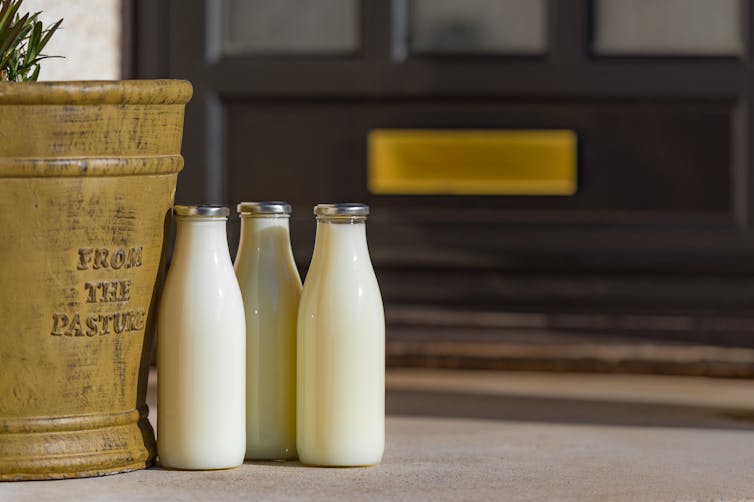Siobhan Maderson, Aberystwyth University
When people think about ways to help the environment, encourage biodiversity and decrease greenhouse gases, they don’t usually think about the impact of food waste. And yet food waste is responsible for up to 10% of global greenhouse gas emissions. Producing food for a growing global population is a complex challenge with a lot of negative environmental consequences, so food waste creates unnecessary strain on our fragile environment.
I was part of a recent research project with the UK Global Food Security programme, which explores ways to cut food waste. Our key findings and suggestions address waste throughout the food system – that includes all the processes, people and infrastructure involved in getting food from farm to fork. We found that cutting food waste needs cooperative action from all of us – businesses, policymakers and individuals. The most commonly wasted foods are fresh fruit and vegetables, bread and baked goods, and leftovers. Products with short shelf lives, such as meat and dairy, are also prone to be wasted.
Domestic food waste declined in the UK dramatically during the early pandemic lockdowns, with 30% using up more leftovers, but waste levels are increasing again as people go out more and have less time to cook.
Here are five things you can do:
1) Set your fridge to below 5℃: This can help increase the shelf life of many of the most commonly wasted foods, including fruit, vegetables and dairy products. About 90% of milk waste happens in the home – this adds up to nearly 500 million pints annually in the UK. Setting your fridge to the right temperature can save 50,000 tonnes of milk waste every year. Yet many of us don’t know how to adjust our fridge temperature, or how best to store food.
WRAP, a charity working on cutting waste, has guidance on understanding and adjusting fridge temperatures, and the best ways to stop milk and dairy products being wasted.
2) Single-use plastics: Many of us are seeking to decrease the amount of single-use plastics in our lives, and in our shopping baskets. This is good – but often these plastics and packaging keep food fresh for longer. Fortunately, there are significant developments towards a post-plastic world. Scientists are working on developing methods of treating and storing food that can extend its shelf life. For now, if you’re going to ditch the plastic wrap, make sure you store food in reusable containers in the fridge to maintain freshness.
3) Dish up smaller portions: This results in up to 20% less food waste If you have leftovers, make sure you enjoy them, and don’t forget about them.
The reasons behind domestic food waste are complex. Many of us put our leftovers in the fridge, then forget about them. Fortunately, there are many ways to manage our fridge contents effectively and decrease food waste. These range from apps, to the humble Post-it note, or pen. Labelling leftovers reminds us when they went in – and when they need to be eaten by. Try and freeze meat, dairy and bread if they are close to spoiling – this will extend their life.
4) Buy directly from local suppliers: Our food systems and supply chains are incredibly complex. This complexity, as well as contracts which tend to favour larger suppliers, leads to high levels of food loss and waste. In contrast, buying directly from local suppliers results in less waste and keeps money in the local economy. It’s possible to buy almost anything – fruit, veg, bread, meat, dairy – directly from suppliers. Support a local business, eat quality food, and decrease waste.

5) Help out at your local food bank: Suppliers often have awkward quantities of fresh food that is damaged and can’t be sold. They are more than happy to get this to a local group that prepares meals or distributes extra food surplus directly to the public – and apps like Too Good To Go are helping restaurants in the UK to do this.
But logistical challenges – and costs – mean that this food often still goes to waste. Food banks often have an excess of tinned and processed food – and a limited amount of fresh food available for people who need it. Let your local redistribution hub know that you’re available to help pick up some spare food and transport it to a nearby redistribution centre.
Food waste is a complex problem that won’t be solved by individual actions alone. Supermarkets are rising to the challenge of shrinking their environmental footprint. But we all need to do what we can to decrease food loss and waste, at the household level and beyond.
Siobhan Maderson, Post-Doctoral Research Fellow and Associate Lecturer in the Department of Geography and Earth Sciences, Aberystwyth University
This article is republished from The Conversation under a Creative Commons license. Read the original article.












